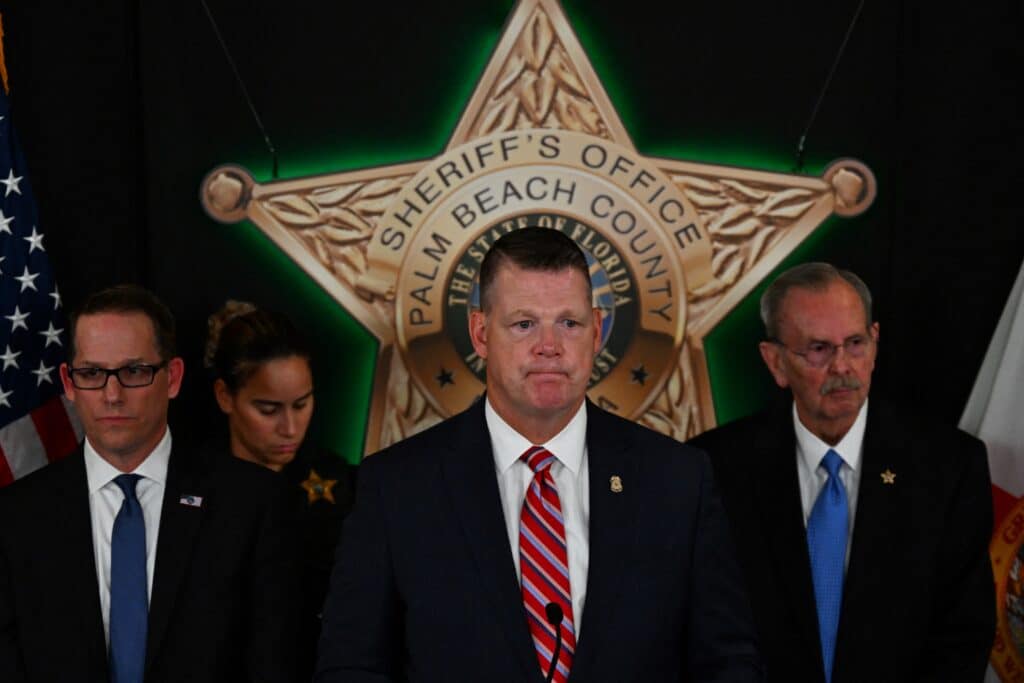
US Secret Service Acting Director Ronald Rowe Jr. looks on during a news conference about the attempted assassination attempt on former US President and Republican presidential candidate Donald Trump, at the Palm Beach County Sheriff’s Office on September 16, 2024 in West Palm Beach, Florida. | Photo by Chandan Khanna / AFP
WASHINGTON, United States — Two assassination attempts against Donald Trump, bomb threats impacting a town’s immigrant community, and a fringe party urging Kamala Harris’s murder. The United States’ coarsening political discourse has led to mounting menace and actual violence.
In a neck-and-neck US presidential election, tensions have soared along with the rhetoric: people have been killed, and the country’s presidential candidates and others are in the crosshairs of extremists swept up in the divisive language of the race.
READ MORE:
Trump safe after apparent assassination try, person in custody
Trump blames Biden, Harris ‘rhetoric’ for assassination attempts
‘I HATE TAYLOR SWIFT,’ Trump tweets
Sunday’s attempt on Trump’s life, the second in two months, was foiled, and few details have been released about the suspect’s motive.
Barely 20 hours after Secret Service agents discovered and chased the would-be shooter away from the former president’s Florida golf club, Trump was telling Fox News Digital on Monday that the rhetoric of Harris and the Biden administration “is causing me to be shot at.”
“Because of this Communist Left Rhetoric, the bullets are flying, and it will only get worse!” Trump added on his Truth Social platform.
US lawmakers and analysts have been voicing concern since the 2021 US Capitol insurrection that increasingly bellicose campaign language was becoming a worrying contusion on the body politic ahead of November’s presidential election.
Democrats have accused Trump of creating a climate of raw political fear, with President Joe Biden himself warning of the risk of “chaos,” particularly with Trump’s repeated refusal to commit to recognizing the results of the upcoming election.
‘Break her kneecaps’
Discourse that was once taboo is now commonplace on the far-right, with hardline Republicans in Congress incorporating violent language and imagery into stump speeches.
Many — including some Republicans — argue Trump incited the deadly US Capitol riot on January 6, 2021, when he continuously and falsely claimed he won the poll against Biden and exhorted his followers to “fight like hell.”
Now, fears have swelled that a second, better-armed and -organized version of January 6 could be on the horizon should Trump lose to Harris in November.
READ MORE:
Trump recounts assassination attempt: ‘Not supposed to be here’
Trump says Kamala Harris ‘destroyed’ California
The country’s political divisions came into sharp focus with Trump’s 2017-2021 presidency, notably with a white supremacist rally in Charlottesville and the 2020 murder of George Floyd and subsequent protests.
Lawmakers and members of the judiciary have increasingly been the subjects of death threats, prompting some officials to reportedly beef up their security.
By 2022, boundaries of political discourse had eroded to such a degree that Republican Senator Susan Collins warned she “wouldn’t be surprised” if a US lawmaker were killed.
Two weeks later, then-House speaker Nancy Pelosi’s husband was attacked with a hammer by a far-right conspiracy theorist who wanted to hold the Democratic leader hostage and “break her kneecaps.”
Calls for violence
On Sunday, even as many expressed revulsion at the latest apparent plot against Trump, Elon Musk, the world’s richest man, took to his X platform to offer an incendiary take.
“And no one is even trying to assassinate Biden/Kamala,” he wrote, with a “thinking face” emoji attached. He later removed the post.
The Libertarian Party of New Hampshire inexplicably went further, posting Sunday on X that anyone who assassinates Harris would be “an American hero.” Law enforcement reportedly said it was investigating.
Since becoming a candidate for another White House term, Trump has been repeatedly singled out for his comments targeting immigrants.
Recently he has doubled down, blaming them for “poisoning” the country and said “they’re eating the pets” in Springfield, Ohio, triggering a climate of fear among the city’s Haitian migrants.
But while political violence is “alarming,” it is not new and “has been part of the US since the nation’s founding,” Professor Peter Loge of George Washington University told AFP.
He listed a series of “riots, assassinations and assassination attempts” targeting leaders from Abraham Lincoln to Ronald Reagan.
Many experts agree, however, that such violence flared with the arrival of Trump, who himself has “repeatedly endorsed violence,” Loge was quick to point out.
Biden, the outgoing president, stressed Monday there is “zero” place for political violence in the country.
“In America we resolve our differences peacefully at the ballot box, not at the end of a gun,” he told a university conference.
Still, citizens are bracing for more. According to an Ipsos poll published in May, 68 percent of Americans fear further violence after November’s election.